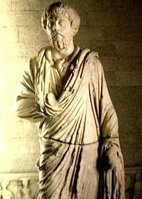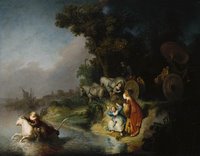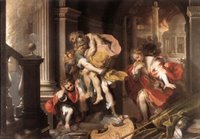- Weaknesses and Strengths of Constantius
- Julian tries to rebuild the temple
- Julian's Death
- Strengths and Weaknesses of Julian
Friday, December 5, 2014
Ammianus Marcellinus (extra credit)
While there are good translations of Ammianus Marcellinus' writings online, none of them are really easy to navigate. Fascinating stuff, however. Here are a couple of selections you might look at:
Monday, November 17, 2014
Herodian of Antioch (extra credit)
 Herodian of Antioch's History of the Roman Empire is an important source for the AD 180-238 period. Choose one of the emperors from this period (possibilities include Commodus, Pertinax, Didius Julianus, Septimius Severus, Macrinus, Bassianus, and Alexander Severus) and note what Herodian has to say about that emperor. Cite here an example of that emperor's competence (or lack thereof) and an example of the difficulties that emperor faced, looking especially for problems that emperor had with the Roman army.
Herodian of Antioch's History of the Roman Empire is an important source for the AD 180-238 period. Choose one of the emperors from this period (possibilities include Commodus, Pertinax, Didius Julianus, Septimius Severus, Macrinus, Bassianus, and Alexander Severus) and note what Herodian has to say about that emperor. Cite here an example of that emperor's competence (or lack thereof) and an example of the difficulties that emperor faced, looking especially for problems that emperor had with the Roman army.
If you prefer, you might comment on one of the important women leaders, e.g., Julia Maesa or Julia Mamea. You might also like looking at what Herodian has to say about Xenobia, the queen of Palmyra.
You may find the site linked here a bit difficult to navigate. Persevere! Use the "page" button at the top to navigate through the eight *books* of this history looking at the book heading to see which emperors are included in that book. Once you find the right book, click through each of the chapter links to find the material on the emperor you want to talk about.
Marcus Aurelius' Meditations (extra credit)
 Plato said that, in an ideal society, the philosophers would be the kings, or the kings would be philosophers. Marcus Aurelius in some ways would seem to be exactly the kind of "philosopher emperor" Plato would have wanted. Please read the opening sections of Marcus Aurelius' Meditations. Choose a line that particularly well shows one of the things Aurelius particularly values, and note whether this value would make him a good emperor or not.
Plato said that, in an ideal society, the philosophers would be the kings, or the kings would be philosophers. Marcus Aurelius in some ways would seem to be exactly the kind of "philosopher emperor" Plato would have wanted. Please read the opening sections of Marcus Aurelius' Meditations. Choose a line that particularly well shows one of the things Aurelius particularly values, and note whether this value would make him a good emperor or not.
Suetonius' Twelve Caesars (extra creidt)
 Suetonius' Lives of the Caesars is one of the most important sources for the period following Nero's Death. Among his "Twelve Caesars" are Galba, Otho, Vitellius, Vespasian, Titus, and Domitian Suetonius includes all sorts of fascinating biographical details about the men he describes--along with plenty of sometimes unverifiable gossip and rumor.
Suetonius' Lives of the Caesars is one of the most important sources for the period following Nero's Death. Among his "Twelve Caesars" are Galba, Otho, Vitellius, Vespasian, Titus, and Domitian Suetonius includes all sorts of fascinating biographical details about the men he describes--along with plenty of sometimes unverifiable gossip and rumor.For extra credit, please read Suetonius account of any one of the caesars of this period (links above) . Pick an incident from the life of this caesar that shows a way in which Augustus' system (the Principate) can work well, or an incident that shows that system created by Augustus was not working out particularly well.
If you have fallen behind on your blogs, you can add to your extra credit by doing an extra blog entry on a *different* ceasar than you talk about in your first post.
Selections from Tacitus' Histories (Extra Credit)
 Most of the historical works written by the Romans disappeared long ago. But while other books were lost, Tacitus' works survived--though, sometimes, just barely. Can you guess why this might later figures thought the works of Tacitus worth preserving? Please read the first few paragraphs of Tacitus' Histories, and see if you can find a line or two that explains the appeal of Tacitus and his approach to history.
Most of the historical works written by the Romans disappeared long ago. But while other books were lost, Tacitus' works survived--though, sometimes, just barely. Can you guess why this might later figures thought the works of Tacitus worth preserving? Please read the first few paragraphs of Tacitus' Histories, and see if you can find a line or two that explains the appeal of Tacitus and his approach to history.
Thursday, October 23, 2014
Ovid (due Thursday, October 30)
 Most of the Greek and Roman myths you read in high school were re-tellings of stories from Ovid's Metamorphoses. Choose your favorite myth and read Ovid's version of that myth. Read also one of the Ovid myths that you *hadn't* read before. Cite one example for each myth that shows particularly well Ovid's "insight into the human condition."
Most of the Greek and Roman myths you read in high school were re-tellings of stories from Ovid's Metamorphoses. Choose your favorite myth and read Ovid's version of that myth. Read also one of the Ovid myths that you *hadn't* read before. Cite one example for each myth that shows particularly well Ovid's "insight into the human condition."If you want to get the overall picture of the Metamorphoses, see this excellent introduction and commentary by Larry Brown.
Virgil--Aeneid (due Tuesday, Oct. 28)
 For Tuesday, please read this summary of Virgil's Aeneid. Then read as much as you can of Book I and Book II. Skimming through Book I is sufficient. Please read Book II with a bit more care.
For Tuesday, please read this summary of Virgil's Aeneid. Then read as much as you can of Book I and Book II. Skimming through Book I is sufficient. Please read Book II with a bit more care.Cite a line or two from Book I or Book II that particularly well show Virgil's "insight into the human condition," i.e., that shows his understanding of subjects like fate, the relationships between men and women, relationships between men and gods, the impact of war, etc.
Subscribe to:
Posts (Atom)

